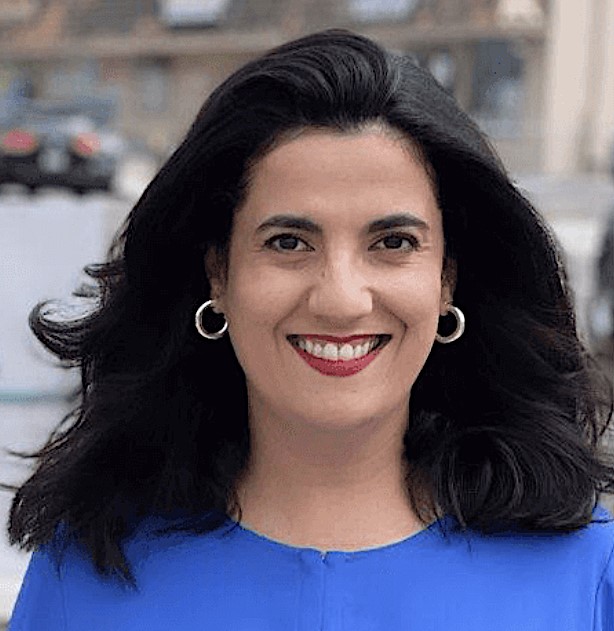La Mesa City Council hopeful Mejgan Afshan, the 43-year-old co-founder of civil rights organization Borderlands for Equity, would like to expand homeless outreach, increase affordable housing for low and very low-income households, and create a stipend for electric bike users.
The city, she said, is in transition from a cozy little village into a burgeoning big city and requires service and infrastructure expansion to meet the needs of the community.
To address homelessness, she would expand the hours of operation and services provided by the city through its Homeless Outreach Mobile Engagement program as well as wraparound services offered by community partners including local faith-based organizations like La Mesa First United Methodist church.
“We need to do better by people who are either struggling with mental health illnesses or dealing with addiction problems… We need to be much more compassionate towards them and make sure to support them and make sure they secure housing. I think a temporary shelter and expanding the HOME program will address these needs,” Afshan said.
The HomeStart program provides shelter at different locations and is worth supporting, Afshan said.
She would also seek regional funding from the county of San Diego to develop homeless outreach agencies which respond to calls for services.
“I want to make sure to work with our regional partners at the county and with offices like supervisor Nathan Fletcher as well as our state providers to access funds allocated towards our houseless problem,” Afshan said.
The government cannot be seen as the enemy, she said, and although “there are so many people using this election as a means of really vilifying our government whether it be local, county or statewide, it is our partners at the regional and the statewide level that are really addressing homelessness,” Afshan said.
The problem has reached the point where “we need government to step into and really expand programs” as part of a regional plan alongside nonprofits working in the community.
“We are part of a regional community and need to work in unison because the border of La Mesa and El Cajon or the border of the city of San Diego and La Mesa might be clear on paper but to folks that are houseless and suffering, they don’t exist,” Afshan said.
To prevent more people from becoming homeless, she would like the city to extend rental assistance for families in need.
“To make sure families do not end up on the streets, we have to expand access to affordable housing. This is something that keeps coming up and people keep asking why we have so many buildings being built in La Mesa, but the folks that are struggling are making under $65,000 a year. If we can address these issues and create accessible and affordable housing for the very low income, that’s where we will be able to keep people off the streets,” Afshan said.Service information should also be more widely available on hand at public schools and accessible in neighborhoods with known low-income families.
“One of the things we can do as a city that’s super cheap is improve our website, make sure people know how to find what it is that they need in a very clear and simple fashion. This would help folks access the resources that are available already to them,” Afshan said.
People can also be steered toward wise financial decisions, she said, in a preventative effort against homelessness.
“I was actually a financial literacy trainer for the International Rescue Committee, I helped new Americans and refugees coming to the United States learn how to do basic things like set up a bank account and apply for a job… we can do better by our community members by making sure we have staff to explain city processes and direct people toward help,” Afshan said.
The La Mesa Entrepreneurship Accelerator Program is a good example of how the city can fund and advocate for successful business development to lift residents up, Afshan said so there is a mentorship component as well as money involved.
Currently, she said, there are nine affordable housing projects being built but there is no clear process for how to get La Mesans connected with that housing.
“We need to be able to help make that process a little bit better and direct them towards how to secure the affordable housing that is accessible right now,” Afshan said.
With future projects, she would like the city to utilize public land wisely, to build affordable housing near public transportation. Additionally, she would like the city to develop design guidelines to preserve the character of La Mesa while making headway on the Climate Action Plan.
“I don’t have an exact name of a partner we could work with but there are some wonderful groups trying to develop all-electrified housing. When you have developers dedicated towards electrifying an entire building, we’re going to reduce our carbon footprint to hit like ten birds with one stone and protect the environment while making sure we have apartments near transportation, decreasing traffic,” Afshan said.
“We need policy to secure very low to low affordable housing prices for folks that are struggling and by struggling I mean teachers, I mean nonprofit workers. I mean all of us that are actually contributing to the quality of our communities. We need to create a policy where at least 15 to 20 percent of affordable homes are secured for the low to very low pay working families that are in need,” Afshan said.
Although she hears some complaints about the trolley system, Afshan maintains there is a gap between those who use the system and those who can’t imagine using the system because they only drive.
“We need to be able to find ways to bridge those gaps… If it’s not a part of your lifestyle then introduce it into your lifestyle. The same thing goes for buses and bike lanes. How do we do that? Advocacy and making sure we’re creating more awareness as to when systems are available and how they can be used,” Afshan said.
Ridership analysis reveals where residents can make use of the trolley, she said. Just as more routes were added for Oktoberfest, they could be added for other events and adjusted as ridership changes. Children can also be taught to ride the trolley from a young age, growing the use of public transportation into their culture.
“During the pandemic, I wanted to create a stipend for folks to purchase electric bikes. It’s something that I’d love to introduce and get feedback. Could we direct some of the funding from COVID pandemic dollars toward that? It’s something that’s affordable, encourages our city to support a bike purchase and would improve the culture of La Mesa,” Afshan said.
It is important to not just consider an idea but “grab at the opportunity to improve the lives of the people who live here,” Afshan said.














